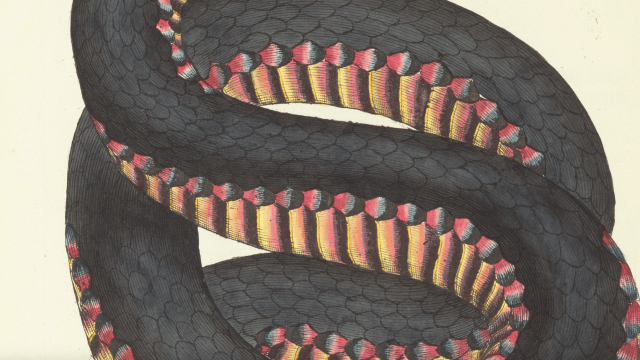
Violet-black-snake-1794
Online via Zoom, please contact Monique Rooney for the link.
In May 1770, Joseph Banks described sea snakes near the coast of ‘New South Wales’ as ‘beautifully spotted’. In 1788, Watkin Tench noted the ‘[l]arge snakes beautifully variegated’ around Botany Bay and Port Jackson. The one snake appearing in The Zoology of New Holland (1794) is described as a ‘beautiful Snake’: its ‘colour on the upper parts is a glossy violet-black; the sides of an elegant deep crimson’. Clearly aestheticized representations of snakes like these persist into the nineteenth century in accounts by Europeans reporting on the natural history of New South Wales. But alongside them on the pages of The Sydney Gazette and other nineteenth-century colonial newspapers emerged an ever-expanding corpus of settler stories in which sons, dogs, livestock, and husbands are bitten by ‘large, black snakes’. These stories culminate in the ‘black brute, five feet long’ who is at the centre of Henry Lawson’s short story, ‘The Drover’s Wife’, a tale of hard-bitten settler stoicism published in the decade preceding Australia’s Federation. In this paper, I explore the tension between the aestheticizing lens of the scientist-explorer-officer and the baleful representations of snakes by settlers, examining the influence of eighteenth-century natural history illustration conventions, the complicated symbolic function of snakes in eighteenth and early nineteenth-century literatures, and both settlers' and scientists' moves to possession.
Speaker bio:
Alexis Harley lectures in literary studies at La Trobe University, where she's the Graduate Research Coordinator for the Department of Languages and Cultures. She writes about nineteenth-century evolutionary theory and life writing, Romanticism and natural history. More recently, Alexis has been working on how literary cultures shaped natural history-making in colonial Australia's long nineteenth-century.
Presented as part of the 2025 Centre For Australian Literary Cultures (CALC) seminar series.
Location
Speakers
Event Series
Contact
- Monique Rooney